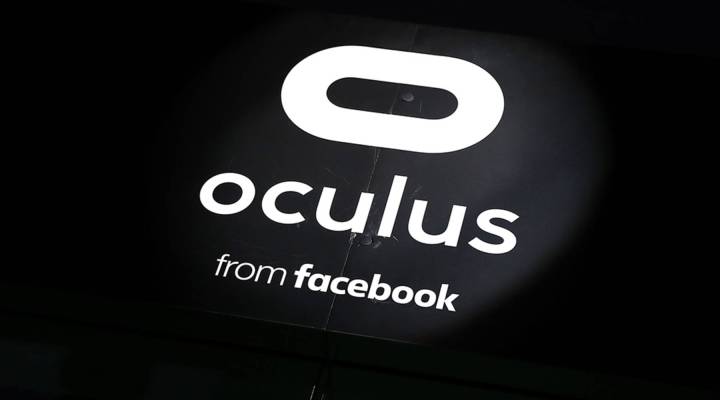
How much did the rise and stall of Oculus have to do with Facebook?
How much did the rise and stall of Oculus have to do with Facebook?

Back in 2014, the virtual reality company Oculus was poised to revolutionize VR for gaming. The Oculus Rift headset was for gamers, by gamers. End of story. But then Facebook bought the company for about $2 billion. Facebook had a much bigger vision for virtual reality as the future of engagement: people hanging out in VR like they did on the news feed, having a good time and watching ads for hours. In 2019, that vision is still just a vision. In fact, the Oculus true believers never forgave the company. Host Molly Wood talked with Blake Harris, author of “The History of the Future: Oculus, Facebook, and the Revolution That Swept Virtual Reality.” The following is an edited transcript of part two of their conversation. Listen to part one here.
Blake Harris: What was so special and significant about Oculus was this idea of being beloved, of having such a strong connection with their user base and with their community.
Molly Wood: That is a big part of the book, this backlash. When Oculus was sold to Facebook, people felt really betrayed. You talk about Palmer Luckey getting death threats. Do you think that, in addition to not ever really maturing gaming on the platform, that that loss of the fan community — we know how important that can be — that that loss really did prove to be more significant than people realized?
Harris: You’re absolutely right. I mean, you also have to remember that this was a Kickstarter company. This was a crowdfunded company. It almost was like watching a reality TV show because every few days they put out an update. They had such a great relationship with their customer base. Maybe, like a reality show, that wasn’t the fully authentic, behind-the-scenes look, but you felt like you were a part of it. Then after the acquisition, that just stopped. I think that I was a little skeptical or I thought that the backlash was a little bit of an overreaction. But, at the same time, I had someone at a book signing ask me last week about Oculus’ new headset coming out this spring, the Oculus Quest. They said, “It seems like an incredibly affordable, great technological headset,” and I said, “Yep.” And they said, “But should I buy it, because I don’t trust Facebook?” And I really have no good answer, because I want you to buy it, because then it will help make VR more popular. But I totally have those concerns, and I wouldn’t blame someone for not purchasing the headset because of that.
Wood: I assume, then, that you view this book as a cautionary tale for other startups.
Harris: Yeah. Around the time of the acquisition of Oculus, Facebook had also recently acquired Instagram and also, a month prior, acquired WhatsApp. Their big pitch to Oculus was, look how much autonomy we’ve given these two companies. It’s significant to me that, last year or the year before that, the founders of WhatsApp, Instagram and Oculus, almost all of them were gone. The opening quote of the book is that quote from “Mad Men” where Peggy Olson says, “You never say thank you.” And Don Draper says, “That’s what the money is for.” For founders or entrepreneurs to be aware of the bargain that’s being made when you sell your company, that no matter what you’re told, you are going to lose control and that is what the money is for. Make sure it’s enough money to make you happy.
Related links: more insight from Molly Wood
In case you’re wondering just how far Oculus has strayed from the gamer world, recent job postings suggest Facebook is preparing enterprise versions of its cheapest headsets for business use. To be clear, Facebook already offers Oculus Rift bundles for business, but that’s the high-level headset that requires a PC to run. These latest job postings, which were uncovered by Variety, say that Oculus is looking to develop its cheaper Oculus Go and Oculus Quest devices, which are portable and don’t require any other gear to operate.
Currently, that business market is quietly being gobbled up by Microsoft and its HoloLens augmented reality headset. When HoloLens 2 was unveiled back in January, Microsoft continued to pitch it as the perfect tool for medicine, engineering, architecture and design. Even as Magic Leap finally released its headset last year and Apple is possibly going to do augmented reality at some point, Microsoft is reportedly already working on a gaming version of the HoloLens. It’s also been hinting at trying to pivot to consumers soon. Oculus might still win the virtual reality wars, but Microsoft could have us all wearing dorky headsets before anybody else.
There’s a lot happening in the world. Through it all, Marketplace is here for you.
You rely on Marketplace to break down the world’s events and tell you how it affects you in a fact-based, approachable way. We rely on your financial support to keep making that possible.
Your donation today powers the independent journalism that you rely on. For just $5/month, you can help sustain Marketplace so we can keep reporting on the things that matter to you.












